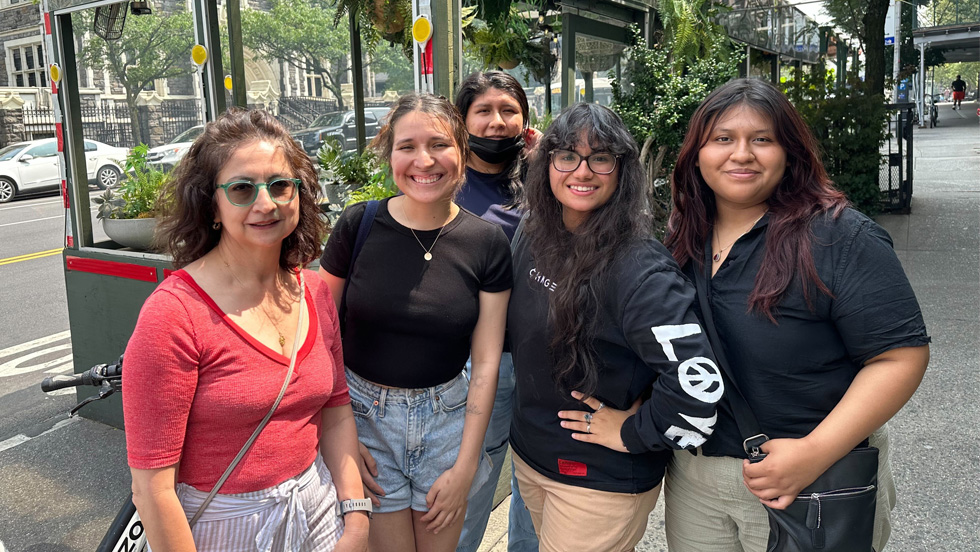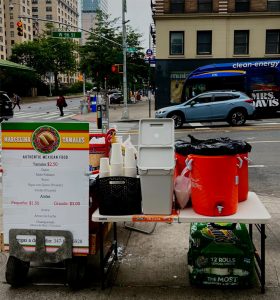
Jacqueline Olvera, PhD, director of Latin American and Latinx Studies and associate professor of sociology, and students spent an eye-opening summer with the hardworking, entrepreneurial women who sell tamals on street corners.
During Summer of 2022, Jacqueline Olvera, PhD, director of Latin American and Latinx Studies and associate professor of sociology, was in Central Harlem, where she saw shopping carts chained to posts that she learned were used by Mexican immigrant women who sell tamals and other food items. Her interest was piqued, and during her sabbatical in Fall 2022 she began focusing her research on these tamal sellers who frequent the street corners of upper Manhattan.
She gathered information on a dozen vendors. Her plan was to include one student in her fieldwork during the Summer of 2023 who would help her expand this sample. Thanks to an Adelphi Faculty Development Grant, she was able to offer four students, from various majors, invaluable social science research experience. These students expanded the group to about 40 tamal vendors. The additional field researchers also allowed Dr. Olvera to grow the geographic area covered and the times of day: She focused on Central Harlem and Upper Manhattan; the students expanded it to East Harlem and the Upper West Side. Mornings were her primary time for fieldwork; students covered into the afternoon.
“There’s something about getting students out of the controlled environment—it’s an opportunity for them to understand that the social world is a lab and one can do research outside the typical STEM lab,” said Dr. Olvera. “It’s also a chance for us to have more mentor/mentee relationships between professors and students.”
Student Researchers Gain Valuable Experience in Social Science

A tamal vendor’s table on a Manhattan street
Every week, the student researchers—Erica Criollo, Katherine Huerta Ruiz, Anna Varveris and Izzy Villa—took photos, wrote field notes or recorded voice memos, contributed to the building of a database on tamal vending, interviewed women and “hung out” to understand these practically invisible members of New York City, the intricacies of tamal vending and the ways in which Mexican women cobble together their economic futures, Dr. Olvera explained.
Varveris, a junior, is an international relations major, a member of both the Honors College and Levermore Global Scholars program and vice president of the Latino Student Association. After her summer fieldwork, she decided to add a sociology minor.
She said she learned about street vending, cultural adaptations, familial relationships, field research, collecting qualitative/quantitative data, cultural retention, immigration, economics, politics and urban sociology, and “about a subculture that not many people know about or pay attention to,” she said. “The experience allowed me to reflect on my own experiences as a Dominican American and has prepared me better for my future academic and career prospects in working with nonprofit organizations and addressing public policy gaps.”
Villa, a criminal justice and languages and cultures major who’s now completed her degree, had been thinking about going on to a master’s as well as doctoral program—but had never done this sort of research.
“I learned so much in six weeks, such as building a rapport with the women I would sit with every morning or afternoon,” she said. “Many of them are wary about speaking to strangers about their lives, so making a connection with them and building an honest relationship is super important and helpful.
“Selling tamals, or really any food vending, is a science,” Villa added. “One must decide the price of everything, what exactly they are selling, at what time, in what location, who their demographic will be, and when everything will get made. They’ve earned much of my respect, and as a Latina, I am very proud to see how my people have worked so their generations can thrive higher.”
Focusing on Hispanic Cultures and Populations
Dr. Olvera plans to continue the research and share results at professional conferences soon. She also will be using some of what she’s learned so far with her classes, including a sociology class on immigration this fall. She also notes that the work gives more grounding to Adelphi’s Latin American and Latinx Studies program—and further illustrates how students and professors can use the proximity to New York City to further knowledge and education.
“For our students who are Latinx, it’s a way to better understand their own cultures and language. For those who are not, it’s a way to learn about other cultures and put their language study to use,” said Dr. Olvera, who herself has been studying the Mixteco language of Mexico’s Oaxaca and Guerrero states, particularly the mountainous areas where many of the tamal vendors are from.
Dr. Olvera’s research and its involvement of students also help make the case for Adelphi becoming an officially designated Hispanic Serving Institution, as defined by the U.S. Department of Education.
Varveris added, “There is so much to learn from everyday life that we may not be aware of, but that could inspire research like Professor Olvera’s, just by pausing and looking at things more closely or talking to people.”